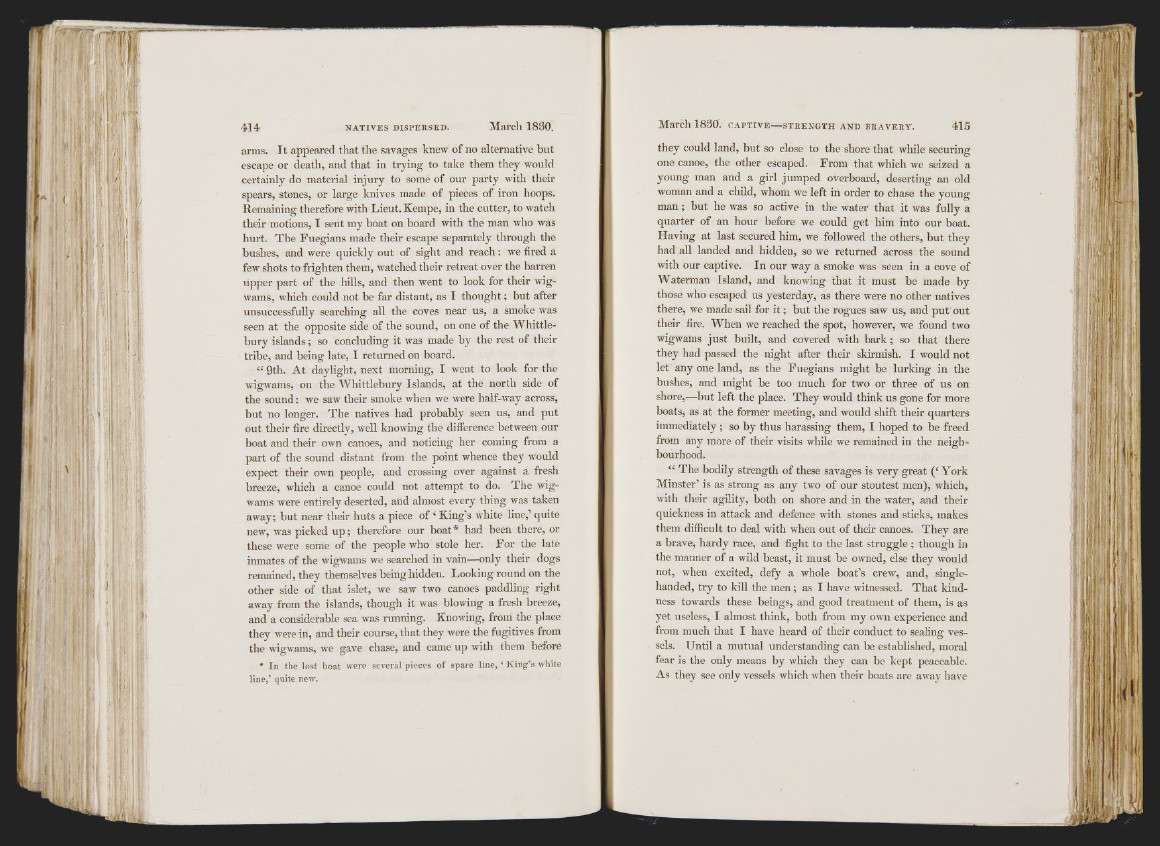
414 NATIVES DISPERSED. March 1830.
arms. It appeared that the savages knew of no alternative but
escape or death, and that in trying to take them they would
certainly do material injury to some of our party with their
spears, stones, or large knives made of pieces of iron hoops.
Remaining therefore with Lieut. Kempe, in the cutter, to watch
their motions, I sent my boat on board with the man who was
hurt. The Fuegians made their escape separately through the
bushes, and were quickly out of sight and reach; we fired a
few shots to frighten them, watched their retreat over the barren
upper part of the hills, and then went to look for their wigwams,
which could not be far distant, as I thought; hut after
unsuccessfully searching all the coves near us, a smoke was
seen at the opposite side of the sound, on one of the Whittle-
bury islands; so concluding it was made by the rest of their
tribe, and being late, I returned on board.
“ 9th. At daylight, next morning, I went to look for the
wigwams, on the Whittlebury Islands, at the north side of
the sound: we saw their smoke when we were half-way across,
but no longer. The natives had probably seen us, and put
out their fire directly, well knowing the difference between our
boat and their own canoes, and noticing her coming from a
part of the sound distant from the point whence they would
expect their own people, and crossing over against a fresh
breeze, which a canoe could not attempt to do. The wigwams
were entirely deserted, and almost every thing was taken
away; but near their huts a piece of ‘ King’s white line,’ quite
new, was picked up; therefore our boat* had heen there, or
these were some of the people who stole her. For the late
inmates of the wigwams we searched in vain—only their dogs
remained, they themselves being hidden. Looking round on the
other side of that islet, we saw two canoes paddling right
away from the islands, though it was blowing a fresh breeze,
and a considerable sea was running. Knowing, from the place
they were in, and their course, that they were the fugitives from
the wigwams, we gave chase, and came up with them before
* In the lost boat were several pieces of spare line, ‘ King’s white
line,’ quite new.
March 1830. cap t ive— s t rength and er a v ery . 415
they could land, but so close to the shore that while securing
one canoe, the other escaped. From that which we seized a
young man and a girl jumped overboard, deserting an old
woman and a child, whom we left in order to chase the young
man; but he was so active in the water that it was fully a
quarter of an hour before we could get him into our boat.
Having at last secured him, we followed the others, but they
had all landed and hidden, so we returned across the sound
with our captive. In our way a smoke was seen in a cove of
Waterman Island, and knowing that it must be made by
those who escaped us yesterday, as there were no other natives
there, we made sail for it; but the rogues saw us, and put out
their fire. When we reached the spot, however, we found two
wigwams just built, and covered with bark; so that there
they had passed the night after their skirmish. I would not
let any one land, as the Fuegians might be lurking in the
bushes, and might be too much for two or three of us on
shore,—but left the place. They would think us gone for more
boats, as at the former meeting, and would shift their quarters
immediately ; so by thus harassing them, I hoped to be freed
from any more of their visits while we remained in the neigh bourhood.
“ The bodily strength of these savages is very great (‘ York
Minster’ is as strong as any two of our stoutest men), which,
with their agility, both on shore and in the water, and their
quickness in attack and defence with stones and sticks, makes
them difficult to deal with when out of their canoes. They are
a brave, hardy race, and fight to the last struggle ; though in
the manner of a wild beast, it must be owned, else they would
not, when excited, defy a whole boat’s crew, and, single-
handed, try to kill the men; as I have witnessed. That kindness
towards these beings, and good treatment of them, is as
yet useless, I almost think, both from my own experience and
from much that I have heard of their conduct to sealing vessels.
Until a mutual understanding can be established, moral
fear is the only means by which they can be kept peaceable.
As they see only vessels whicli when their boats are away have
I I'
li'» I
Iii
l l ■
" I r '